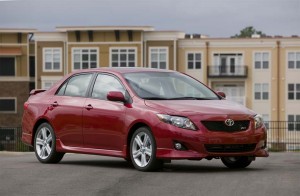
More than 200 separate lawsuits have been filed against Toyota, many seeking class-action status, in the wake of its recent safety problems.
Facing an avalanche of litigation that could result in as much as $40 billion in payoffs to those claiming injury from problems with runaway vehicles, Toyota wants a panel of federal judges to consolidate more than 200 separate “sudden acceleration” lawsuits before a single California judge.
But lawyers representing a variety of plaintiffs told a U.S. Panel on Multidistrict Litigation that they’d prefer to have their cases heard by courts in New Jersey, Florida, Kentucky, and other parts of the country.
The Panel, operating out of federal court in San Diego, has been empowered to try to reign in the growing number of lawsuits targeting Toyota for its ongoing safety problems, an issue that could tie up the courts – and the automaker – for years to come.
So far, the company’s attorneys said, 138 potential class-action lawsuits have been filed seeking damages because Toyota’s problems have resulted in falling resale values for its products. Another 97 suits claim damages because of personal injuries and wrongful deaths involving Toyota products.
While Toyota is expected to ask the panel to dismiss the pending litigation as a matter of course, that is considered a long-shot. It has a better chance, according to legal experts, of getting some or all of the suits heard at a single trial.
“All these cases have common issues,” Toyota attorney Cari Dawson told the panel of judges. “There will be significant overlap,” she stressed, arguing that it makes more sense to combine the cases and argue them concurrently.
While some plaintiffs’ attorneys continue hoping to argue their own cases, observers believe that the panel will eventually approve the consolidation. With at least 34 cases already filed in California, the state is considered likely to be the venue for the litigation. It helps that it is near Toyota’s U.S. headquarters, which will make it easy for corporate officials to appear on the witness stand.
“Somebody is going to get this thing, (which will be) a ton of work,” said Cleveland attorney David R. Cohen, who has assisted the courts with similar mass litigation cases, in the past.
If the panel agrees to consolidate the pending litigation it is likely to appoint a handful of lead attorneys. They will oversee the legal process – and other attorneys will have to pay fees to have the lead lawyers handle their cases. Were all the claims against Toyota eventually upheld, the maker could eventually have to pay out as much as $40 billion, according to a tally of the litigation. But for the lead attorneys, the payout could also reach into the billions.
The lawsuits stem from a series of accidents allegedly caused by “runaway” Toyota products. The problem has led to two separate recalls of more than 8 million vehicles since last October. The automaker insists it has resolved the problem with separate mechanical fixes, including one addressing potentially sticky accelerators by inserting a metal shim into the pedal assembly.
But a number of the plaintiffs are claiming that there are mysterious and as yet-unidentified problems with the electronic control systems on Toyota vehicles – an argument the automaker has repeatedly rejected.
In a separate development, Toyota Thursday announced that Steve St. Angelo, currently head of the maker’s assembly plant in Erlanger, Kentucky, will become its new chief quality officer for North America.
Toyota came under fire, during two days of Congressional hearings last month, when it acknowledged that key decisions on matters related to quality and safety, were handled by the company’s headquarters, in Japan.
Those corporate offices will still oversee such things, but St. Angelo will serve as a direct liason with U.S. officials, based in the Los Angeles suburb of Torrance. Toyota Vice President Dino Triantafyllos will assist St. Angelo in coming up with a strategy for boosting the visibility of customer complaints about quality and safety issues and to develop recall plans, when needed.
In a February interview, Toyota Vice President Bob Carter acknowledged the need to make sure that complaints directed to dealers weren’t overlooked.
“We are making fundamental changes in the way our company operates,” St. Angelo said in a statement. “The new organization will open the lines of communication globally and enable us to respond faster here in North America to any concerns about our vehicles.”
St. Angelo is to meet regularly with Toyota Motor Co. President Akio Toyoda, starting next Tuesday, in Japan.
